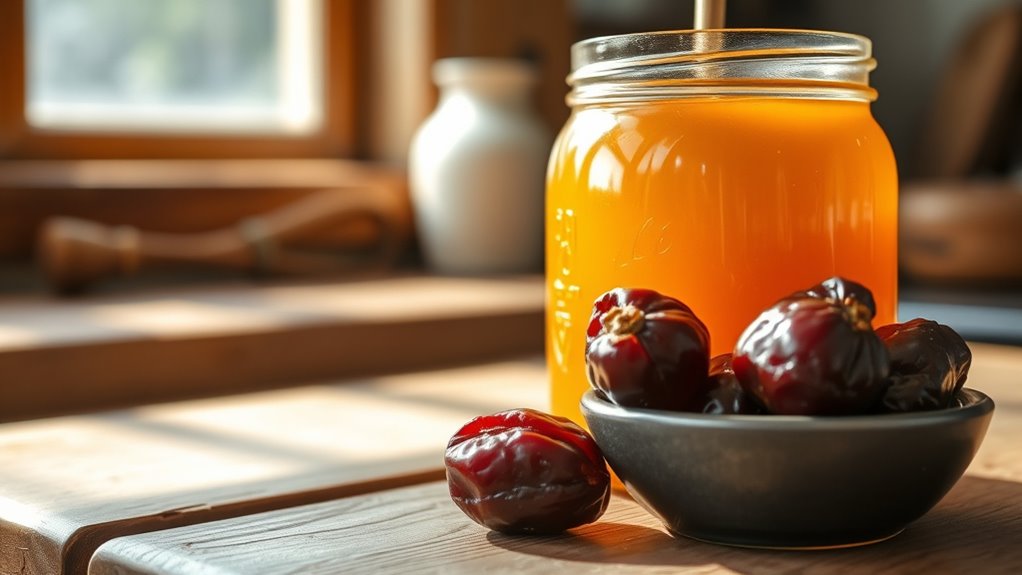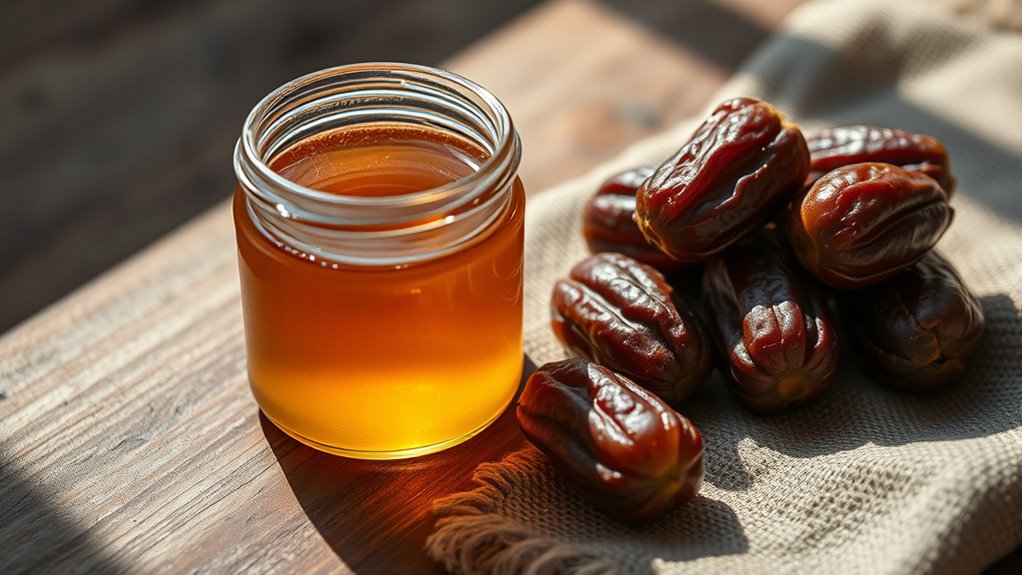You should add honey to warm dishes like teas, dressings, or baked goods after they’ve cooled slightly to preserve its beneficial enzymes and antioxidants. Use dates by blending or chopping them into recipes like smoothies, energy balls, or oatmeal to naturally sweeten and boost nutrition. Incorporating these natural sweeteners at the right stage enhances flavor and health benefits. If you want to explore more tips on when and how to add honey or dates, you’ll find useful insights below.
Key Takeaways
- Add honey to warm beverages, dressings, or marinades to preserve its antioxidants and flavor.
- Incorporate dates into baked goods, energy balls, or smoothies for natural sweetness and added fiber.
- Use honey as a topping for yogurt or oatmeal after cooking to retain its beneficial properties.
- Blend dates into recipes to replace refined sugar, especially in chewy textures like cookies or bars.
- Add honey or dates at different cooking stages based on desired flavor intensity and nutrient preservation.

Natural sweeteners are becoming increasingly popular as more people seek healthier alternatives to refined sugar. When you consider adding something sweet to your recipes, honey and dates stand out as natural options that offer more than just sweetness. Both are packed with nutrients and health benefits, making them excellent choices for those aiming to improve their diet without sacrificing flavor.
Natural sweeteners like honey and dates offer health benefits beyond just sweetness.
Honey benefits go beyond its natural sweetness. It’s rich in antioxidants, which can help combat oxidative stress in your body. When you use honey, you’re not just sweetening your food—you’re also adding a product that may support your immune system, improve digestion, and even soothe a sore throat. The versatility of honey makes it suitable for a variety of dishes, from dressings and marinades to teas and baked goods. Keep in mind that raw, unprocessed honey retains the most nutrients and benefits, so choose wisely when shopping. Its natural sugars also tend to have a lower glycemic index compared to refined sugar, meaning it won’t spike your blood sugar levels as quickly. This makes honey a more mindful choice, especially if you’re managing blood sugar concerns.
Dates are another fantastic natural sweetener, especially known for their impressive nutrition profile. Dates nutrition includes high levels of fiber, vitamins like B6 and K, and minerals such as potassium, magnesium, and copper. These nutrients support your overall health, aiding in digestion, maintaining healthy blood pressure, and promoting energy production. When you add dates to your recipes, you’re not just sweetening your food—you’re also enriching it with these essential nutrients. Dates are naturally very sweet, so they can often be used in small amounts to achieve the desired sweetness. You can blend them into smoothies, chop them into oatmeal, or even use them in baking to replace refined sugars. Their natural sugars are accompanied by fiber, which helps slow down sugar absorption, leading to more stable energy levels. Incorporating natural sweeteners like honey and dates into your diet can also help reduce your reliance on processed sugars, supporting overall health and wellness.
Deciding when to add honey or dates depends on what you’re making and your health goals. Honey works well in warm beverages, drizzled over yogurt, or used as a glaze for meats. Dates are ideal for recipes that benefit from a chewy texture, like energy balls, or as a natural sweetener in baked goods. Both options provide more nutritional value than processed sugars. When you incorporate honey benefits and dates nutrition into your cooking, you’re not just satisfying your sweet tooth—you’re also nourishing your body with wholesome, natural ingredients that contribute to your overall well-being.
Frequently Asked Questions
Can Honey or Dates Be Used Interchangeably in Recipes?
You can’t always use honey and dates interchangeably in recipes because their flavor profiles and textures differ. Honey offers a liquid sweetness, while dates provide a thicker, more fibrous sweetness. For cooking substitutions, consider how each one impacts flavor and consistency. Use honey for a smooth, subtle sweetness and dates for a richer, caramel-like taste. Adjust other ingredients accordingly to guarantee your dish turns out just right.
Are Honey and Dates Suitable for Diabetics?
You might think honey and dates are safe, but for diabetics, the story’s different. Both can spike your blood sugar and trigger a quick insulin response, making them less suitable. While they’re natural, they still impact your blood sugar levels. If you’re diabetic, it’s best to enjoy them sparingly or consult your healthcare provider. Don’t underestimate their sweetness—your blood sugar will thank you for being cautious.
How Do Honey and Dates Affect Calorie Count?
Honey and dates both add calories, so their calorie impact depends on portion size. Honey is more calorie-dense per teaspoon, while dates provide fiber and natural sugars, slightly reducing their calorie impact. When comparing their nutritional values, dates offer more vitamins and minerals, but both should be consumed in moderation to avoid excess calorie intake. Your choice influences overall calorie count, especially if you’re watching your daily intake.
Do Honey and Dates Have Similar Health Benefits?
Yes, honey and dates offer similar health benefits. Both have antioxidant properties that help protect your cells from damage, and their mineral content supports overall health. Honey provides trace minerals like zinc and manganese, while dates are rich in potassium, magnesium, and iron. Including either in your diet can boost immunity, improve digestion, and provide natural energy, making them excellent choices for a nutritious, natural sweetener.
What Are the Best Ways to Incorporate Honey or Dates Into Baking?
Think of honey and dates as your baking secret weapons, adding depth and natural sweetness. To incorporate honey, drizzle it into batters for a glossy finish or swap it for sugar to enhance moisture. Dates work wonders chopped into cookies or blended into smoothies, offering chewy texture modifications. Pair them with flavors like cinnamon, nuts, or citrus to elevate your baked treats, making each bite rich and irresistible.
Conclusion
Think of natural sweeteners like honey and dates as gentle guides on your culinary journey. They’re the seasoned navigators, helping you traverse the landscape of flavors without losing your way to processed sugars. By choosing them wisely, you’re steering your health ship through calm, nourishing waters. Embrace these sweet allies, and watch your creations flourish with authenticity. Ultimately, they’re the quiet guardians of a balanced, flavorful life—always there to add a touch of nature’s magic when you need it most.










